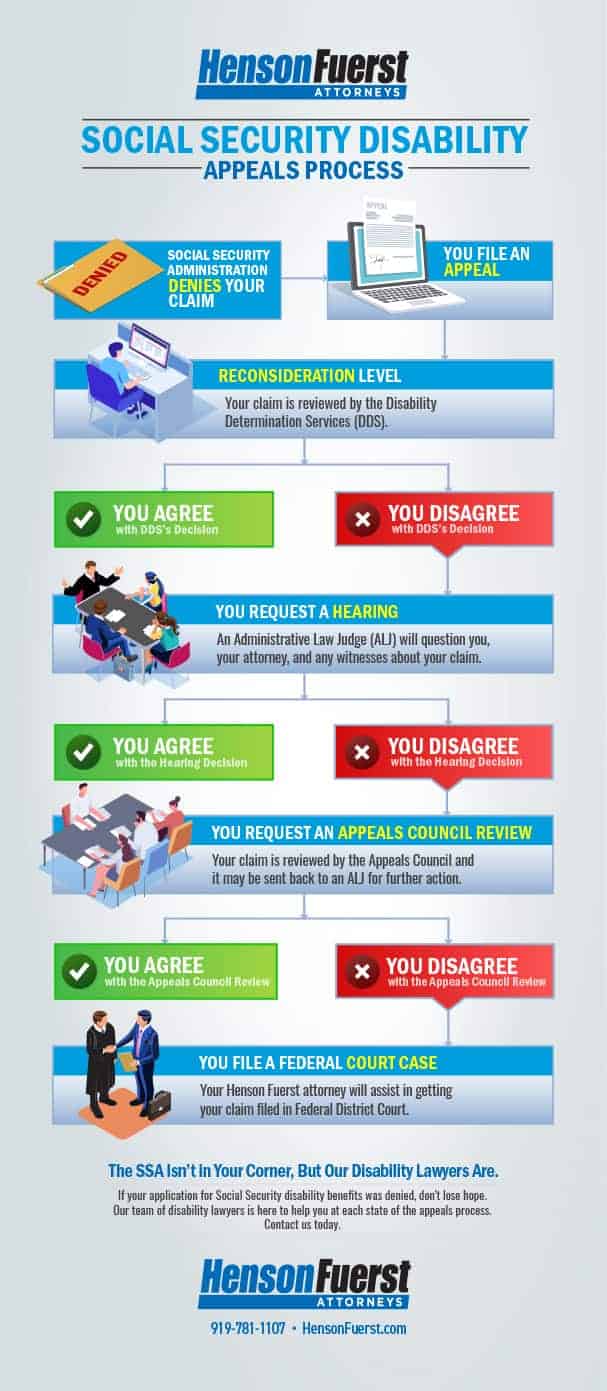How to File A Social Security Appeal: Learn About The Social Security Administration Appeal Process
What To Do If Your SSDI Claim Is Denied: The SSDI Appeals Process
After a Denial, Having a Social Security Disability Attorney on Your Side Could Increase Your Chances of Approval with a Social Security Administration Appeal. Contact Our Team for Help Today.






Social Security Administration Appeal Process
After a Denial, Having a Social Security Disability Attorney on Your Side Could Increase Your Chances of Approval for Benefits
If your Social Security Disability Insurance (SSDI) claim is denied, don't lose hope. You can still pursue your benefits by filing a request for reconsideration and initiating the appeals process with the help of a Social Security disability attorney. There are four steps in the SSDI appeals process, including:
- Reconsideration. Someone from Disability Determination Services (DDS) who was not involved in the initial determination of your application will evaluate your claim and any new evidence provided.
- Hearing. If you disagree with the decision made by DDS, you can request a hearing with an Administrative Law Judge (ALJ Hearing) who will question you and any witnesses you have about your claim. Your attorney will be present during this entire process.
- Appeals Council Review. If you're unhappy with the results of your hearing decision, you can request a review of your claim by the Social Security Administration's (SSA) Appeals Council. However, your request may be denied. If the Appeals Council accepts your request, they will either review your claim themselves or send it to an Administrative Law Judge (ALJ) for further consideration.
- Federal District Court Action. If you're still dissatisfied after the Appeals Council review, your lawyer can file a lawsuit in the Federal District Court. If you're still denied benefits, you have more options. You can file a new application with updated information or try reopening your claim. If you have questions about the appeals process, Henson Fuerst is here to help.
Filing a Request for Reconsideration
When your Social Security Disability Insurance (SSDI) claim is denied, the first step in the appeals process is filing a request for reconsideration. This involves submitting additional information and documentation to support your case. Someone from Disability Determination Services (DDS) will review your claim and any new evidence.
Timeline for Requesting Reconsideration
The reconsideration request must be filed within 60 days of receiving the denial notice. It's crucial to adhere to this timeline to preserve your right to appeal.
Documentation Required for Filing a Request for Reconsideration
For your best chance at approval, you must compile comprehensive medical records, treatment plans, and any new evidence supporting your disability claim. Clear documentation significantly strengthens your case during reconsideration.
How Long Does an SSDI Reconsideration Appeal Take?
Typically, a reconsideration decision takes about 3 to 5 months. The duration may vary based on the case's complexity and the Social Security Administration (SSA) caseload.
How to Win a Disability Reconsideration?
Winning a case at the disability reconsideration phase involves:
- Highlighting any new medical evidence
- Emphasizing the severity of your condition
- Ensuring your documentation aligns with the SSA's disability criteria
Common Reasons for Denial at the Reconsideration Stage
Denials often occur due to insufficient medical evidence, failure to comply with treatment plans, or inadequate documentation. Address these issues in your reconsideration request.
Appealing a Denied Request for Reconsideration
If your request for reconsideration is denied, you can proceed to the next stage of the appeals process.
Understanding the Disability Appeal Hearing Process
The disability appeal hearing is a critical stage in the SSDI appeals process where you present your case before an Administrative Law Judge (ALJ). You and your attorney must request a hearing within 60 days of receiving your reconsideration determination. If you disagree with the reconsideration decision, you can request a hearing online or by completing a HA-501-U5 form and then taking or mailing the original completed form to your local SSA office.
- What Happens During a Disability Appeal Hearing? The ALJ reviews your case, asks you and any witnesses about your condition, and may consult vocational experts. Being prepared, honest, and articulate during the hearing is crucial.
- Role of the Administrative Law Judge in Disability Appeal Hearings: The Administrative Law Judge (ALJ) assesses the evidence, evaluates your testimony, and determines whether you meet the criteria for disability benefits.
- Evidence Presentation During the Disability Appeal Hearing: During your hearing, you and your attorney will present thorough medical evidence, including testimonies from medical professionals and witnesses, to bolster your case.
- Legal Representation Options During a Disability Appeal Hearing: You have the option to be represented by an attorney or a qualified representative during the hearing, enhancing your chances of success.
- How Long Does a Disability Appeal Take with a Lawyer? Having legal representation may expedite the process, but timelines can vary. Generally, it takes 12 to 24 months to complete the hearing stage.
- Outcomes of a Disability Appeal Hearing: Following a disability hearing, the ALJ issues a written decision outlining whether your appeal is approved or denied.

Pursuing an Appeal with the Appeals Council
If you disagree with the ALJ’s decision, you can request an appeal by writing to the SSA and requesting an Appeals Council Review or completing a HA-520 form.
- Steps to Appeal a Decision with the Appeals Council: When filing an appeal with the Appeals Council, you'll want to follow the specified procedures and ensure that all required forms and documentation are submitted.
- Timeframe for Filing an Appeal with the Appeals Council: File your appeal within 60 days of receiving the ALJ's decision. Strict adherence to timelines is essential.
- Documentation Required for an Appeal to the Appeals Council: For your appeal, you must include any additional evidence that strengthens your case. The Appeals Council reviews the ALJ's decision and may remand, modify, or uphold it.
- Considerations When Appealing a Denial with the Appeals Council: You and your representative must highlight errors in the ALJ's decision and provide compelling evidence to support your claim.
- Appeals Council Review Process: The Appeals Council reviews the case and issues a decision. If denied, you can proceed to the final stage of the appeals process.
Understanding the Federal Court Review Process for Disability Appeals
Taking your case to federal court is the last resort in the SSDI appeals process. A disability attorney is crucial to build your case and provide the steadfast representation needed for your best chance of approval.
- When and How to Take a Disability Appeal to Federal Court? If the Appeals Council denies your claim, you can file a lawsuit in federal district court.
- Timeframe for Initiating a Federal Court Review: File the lawsuit within 60 days of receiving the Appeals Council's denial. Federal court reviews can be lengthy, often taking more than a year.
- Critical Factors for Pursuing a Disability Appeal in Federal Court: When pursuing a disability appeal, it is essential that you demonstrate legal errors, procedural mistakes, or substantial evidence supporting your claim to succeed in federal court and secure your disability benefits.
- Legal Representation and Advocacy in the Federal Court Review Process: Having legal representation is crucial during federal court proceedings, ensuring all legal aspects are effectively addressed.
- Outcomes of a Disability Appeal at the Federal Court Level: The federal court can affirm, reverse, or remand the decision. Success in federal court is challenging but not impossible. Navigating the SSDI appeals process requires patience, diligence, and thorough preparation. Seek legal advice to enhance your chances of success at each stage.
Your Disability Attorneys and Advocates Every Step of the Way
When you become disabled and unable to work, a lot is at stake, including your mental, emotional, and financial well-being. Unfortunately, the SSDI claims process can be discouraging, with about 70% of initial applications denied. A denial from the SSA can leave you with many questions and unsure about what to do next, but you don’t have to navigate it alone. Having a reputable disability lawyer by your side is essential for securing the SSDI benefits you could be entitled to by law. At Henson Fuerst, we strive to provide our clients with the highest quality legal representation. We will walk you through the disability claims process from start to finish and stop at nothing to win you the vital financial assistance you need from the SSA.
Absolutely no fee unless we obtain a recovery for you. If a recovery is not made, you pay us nothing. Get help with your Social Security Administration Appeal today!
SOCIAL SECURITY DISABILITY POSTS
Our disability lawyers strive to keep our community educated and informed about the latest trends and events in Social Security disability law.

I have had a great experience with Henson Fuerst, specifically with Attorney Eric Goodale. He is a Social Security disability specialist at the firm. I was in capable, experienced hands through the whole process. He put me at ease from the get-go and has over 20 years experience in Social Security disability law. I would not hesitate to refer anyone to the firm and specifically Attorney Goodale if they are dealing with a disability issue.
Seamus, Social Security Disability Client
Decades of Experience in Disability Law

Eric W. Goodale
Eric Goodale is the Social Security disability attorney at Henson Fuerst. He has handled Social Security disability claims for over 20 years and has exclusively practiced disability law for over 15 years. Before joining the Henson Fuerst team in 2012, Eric spent 7 years practicing Social Security disability law for a nationwide disability law firm in Washington, D.C., where he handled more than 500 disability hearings in 38 states. Before his time in Washington, D.C., Eric spent 4 years in a general practice law firm in Syracuse, New York. Eric earned his Juris Doctorate from Albany Law School in 2000 and he graduated from Penn State University in 1997 with a B.A. in Political Science and a minor in Business Administration. Eric now serves as the senior Social Security disability attorney at Henson Fuerst, a role he has held since 2014.






